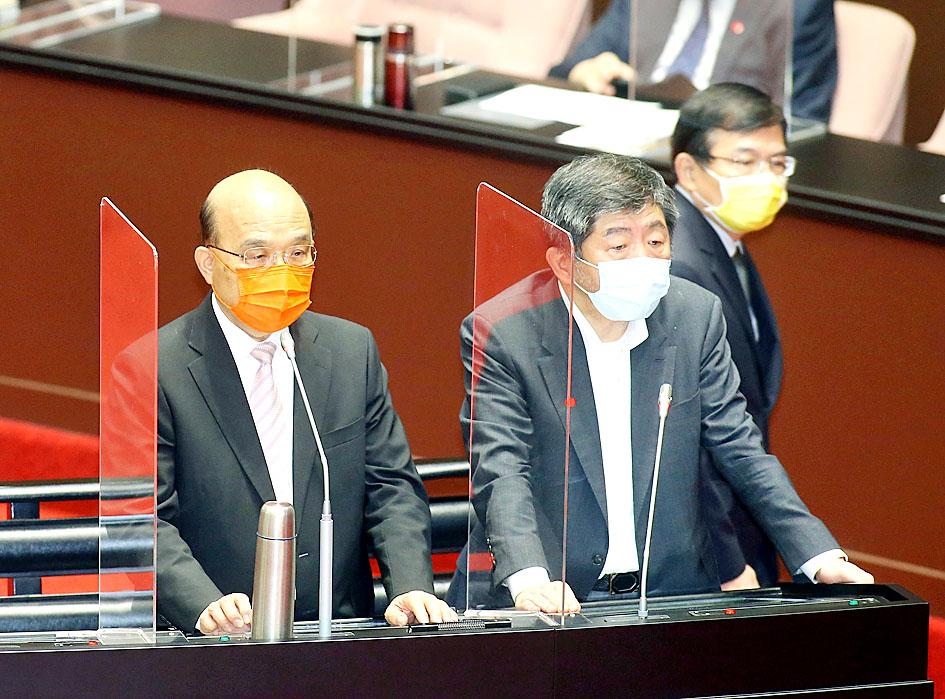The Central Epidemic Command Center (CECC) yesterday reported 274 locally transmitted COVID-19 cases and 25 deaths.
Minister of Health and Welfare Chen Shih-chung (陳時中), who heads the center, said that the local infections, 142 males and 132 females, are aged from under five to over 90, and symptoms began between May 14 and Tuesday.
The confirmed cases are mostly residents of New Taipei City, with 162, followed by Taipei (63), Taoyuan (15), Miaoli County (12), Keelung (10), Changhua County and Nantou County (three each), Yilan County (two), and Hsinchu County, Taichung, Chiayi City and Tainan (one each), Chen said.

Photo: CNA
The 25 deaths were 20 men and five women aged 50 to 100 who began showing symptoms between May 11 and May 30, he said.
The were diagnosed with COVID-19 between May 17 and Saturday, and died between May 29 and Monday, he said.
The local COVID-19 situation has been stable for the past few days, Chen said, adding that crowd controls are still in force and people should avoid traveling over the Dragon Boat Festival long weekend starting on Saturday.
Expanded rapid testing at the nation’s three major science parks after electronics companies in Miaoli County reported cluster infections last week is proceeding smoothly, he said.
Centers for Disease Control (CDC) Deputy Director-General Philip Lo (羅一鈞), deputy head of the CECC’s medical response division, said that among the 296 deaths from COVID-19 reported from May 11 to Monday, 35, or 11.8 percent, died before being admitted to hospital.
It is difficult to assess what happens when people are not hospitalized, so a sudden death at home indicates that COVID-19 symptoms can progress rapidly, Lo said, adding that foreign studies have suggested the main reason for such incidents is “silent hypoxia.”
Such cases might be avoided if people who have tested positive for COVID-19 are hospitalized, or stay at centralized quarantine facilities or enhanced quarantine hotels, he said.
An additional 15,000 pulse oximeters have been distributed to Taipei and New Taipei City for people isolating at home after testing positive in a rapid screening test, he said.
People should immediately call for medical assistance if their blood oxygen level drops below 95 percent, he said.
Chen said that tight hospital capacity is gradually being relieved.
As of yesterday, there were 2,542 COVID-19 patients in hospitals, 1,486 people at centralized quarantine facilities and 1,786 people at enhanced quarantine hotels, Chen said, adding that 2,492 people who tested positive have been released from isolation and 1,260 people are under home isolation after 10 days since the onset of symptoms.
Taiwan’s polymerase chain reaction (PCR) test capacity has increased from about 27,000 per day to about 48,000 per weekday, or up to 80,000 tests if pushed, Chen said, adding that 166 laboratories process the tests.
Asked whether people who had a negative test, but later returned a positive PCR test should be required to return a negative test before being released from isolation, Lo said that 14 days of home isolation was ordered because people have different incubation periods.
If a person under isolation starts showing symptoms, they would be ordered to undergo a PCR test, but as some people do not show symptoms or might conceal their health condition, a CECC advisory panel would discuss whether a PCR test is required for them to be released from isolation, he said.

The Ministry of the Interior (MOI) is to tighten rules for candidates running for public office, requiring them to declare that they do not hold a Chinese household registration or passport, and that they possess no other foreign citizenship. The requirement was set out in a draft amendment to the Enforcement Rules of the Public Officials Election and Recall Act (公職人員選舉罷免法 ) released by the ministry on Thursday. Under the proposal, candidates would need to make the declaration when submitting their registration forms, which would be published in the official election bulletin. The move follows the removal of several elected officials who were

The Republic of China (ROC) is celebrating its 114th Double Ten National Day today, featuring military parades and a variety of performances and speeches in front of the Presidential Office in Taipei. The Taiwan Taiko Association opened the celebrations with a 100-drummer performance, including young percussionists. As per tradition, an air force Mirage 2000 fighter jet flew over the Presidential Office as a part of the performance. The Honor Guards of the ROC and its marching band also heralded in a military parade. Students from Taichung's Shin Min High School then followed with a colorful performance using floral imagery to represent Taiwan's alternate name

FOUR DESIGNATED AREAS: Notices were issued for live-fire exercises in waters south and northwest of Penghu, northeast of Keelung and west of Kaohsiung, they said The military is planning three major annual exercises across the army, navy and air force this month, with the navy’s “Hai Chiang” (海強, “Sea Strong”) drills running from today through Thursday, the Ministry of National Defense said yesterday. The Hai Chiang exercise, which is to take place in waters surrounding Taiwan, would feature P-3C Orion maritime patrol aircraft and S-70C anti-submarine helicopters, the ministry said, adding that the drills aim to bolster the nation’s offshore defensive capabilities. China has intensified military and psychological pressure against Taiwan, repeatedly sending warplanes and vessels into areas near the nation’s air defense identification zone and across

A Chinese takeover of Taiwan would severely threaten the national security of the US, Japan, the Philippines and other nations, while global economic losses could reach US$10 trillion, National Security Council Deputy Secretary-General Lin Fei-fan (林飛帆) wrote in an article published yesterday in Foreign Affairs. “The future of Taiwan is not merely a regional concern; it is a test of whether the international order can withstand the pressure of authoritarian expansionism,” Lin wrote in the article titled “Taiwan’s Plan for Peace Through Strength — How Investments in Resilience Can Deter Beijing.” Chinese President Xi Jinping’s (習近平) intent to take Taiwan by force